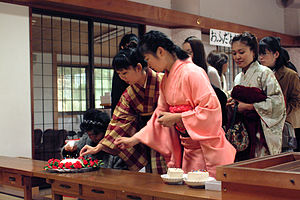| dbo:abstract
|
- Hari Kuyō (jap. 針供養 ‚(Näh)nadel-Andacht‘) ist eine religiöse Zeremonie in Teilen Japans, bei der unbrauchbar gewordene Nähnadeln für ihre Dienste geehrt werden. In Kantō findet Hari Kuyō traditionell am 8. Februar statt, in Kyōto und Kinki am 8. Dezember. In den Präfekturen Toyama und Ishikawa nennt man diesen Tag auch Hari seibō (針歳暮). Sie wird alljährlich als Andacht (kuyō, von sanskrit puja) vorgenommen. Das Ritual wird als Ehrerweisung für die dem Volksglauben entstammende Gottheit Awashima no kami (淡島神) durchgeführt. (de)
- Hari-Kuyō (Japanese: 針供養) is the Japanese Buddhist and Shinto Festival of Broken Needles, celebrated on February 8 in the Kanto region, but on December 8 in the Kyoto and Kansai regions. It is celebrated by women in Japan as a memorial to all the sewing needles broken in their service during the past year, and as an opportunity to pray for improved skills. It is also called the Needle Mass and Pin Festival. "Hari" means "needle" and the suffix "-kuyo" means "memorial", derived from a Sanskrit word pūjā or pūjanā, meaning "to bring offerings". (en)
- Hari-kuyō matsuri (針供養, festival des aiguilles brisées) est un festival bouddhiste et shinto commémoré le 8 février dans le Kantō et le 8 décembre à Kyoto et dans le Kansai. Ce festival est célébré par les femmes en hommage aux aiguilles à coudre qu'elles ont brisées dans l'année qui vient de s'écouler. Les couturières prient aussi pour améliorer leurs compétences. L'événement est également nommé « messe de l'aiguille et de l'épingle ». Hari veut dire « aiguille » ; le suffixe -kuyo signifie « mémorial » et est dérivé d'un mot sanskrit, pūjā ou pūjanā , signifiant « apporter des offrandes ». (fr)
- 針供養(はりくよう)とは、折れ、曲がり、錆びなどによって、使えなくなった縫い針を供養し、近くの神社に納める行事。各地の社寺で行われているが、主に淡島神社(粟島神社)または淡島神を祀る堂(淡島堂・粟島堂)がある寺院で行われる。 (ja)
- 针供养(日语:針供養/はりくよう Harikuyou)是指将由于折断、弯曲、生锈等原因而不能使用的缝衣针供养起来,然后供奉到附近的神社的活动。针供养在日本各地的社寺都有举行,但主要在淡岛神社(粟岛神社)或是设有祭祀淡岛神的堂(淡岛堂、粟岛堂)的寺院举行。 (zh)
|
| dbo:thumbnail
| |
| dbo:wikiPageExternalLink
| |
| dbo:wikiPageID
| |
| dbo:wikiPageLength
|
- 3926 (xsd:nonNegativeInteger)
|
| dbo:wikiPageRevisionID
| |
| dbo:wikiPageWikiLink
| |
| dbp:wikiPageUsesTemplate
| |
| dcterms:subject
| |
| rdfs:comment
|
- Hari Kuyō (jap. 針供養 ‚(Näh)nadel-Andacht‘) ist eine religiöse Zeremonie in Teilen Japans, bei der unbrauchbar gewordene Nähnadeln für ihre Dienste geehrt werden. In Kantō findet Hari Kuyō traditionell am 8. Februar statt, in Kyōto und Kinki am 8. Dezember. In den Präfekturen Toyama und Ishikawa nennt man diesen Tag auch Hari seibō (針歳暮). Sie wird alljährlich als Andacht (kuyō, von sanskrit puja) vorgenommen. Das Ritual wird als Ehrerweisung für die dem Volksglauben entstammende Gottheit Awashima no kami (淡島神) durchgeführt. (de)
- Hari-Kuyō (Japanese: 針供養) is the Japanese Buddhist and Shinto Festival of Broken Needles, celebrated on February 8 in the Kanto region, but on December 8 in the Kyoto and Kansai regions. It is celebrated by women in Japan as a memorial to all the sewing needles broken in their service during the past year, and as an opportunity to pray for improved skills. It is also called the Needle Mass and Pin Festival. "Hari" means "needle" and the suffix "-kuyo" means "memorial", derived from a Sanskrit word pūjā or pūjanā, meaning "to bring offerings". (en)
- Hari-kuyō matsuri (針供養, festival des aiguilles brisées) est un festival bouddhiste et shinto commémoré le 8 février dans le Kantō et le 8 décembre à Kyoto et dans le Kansai. Ce festival est célébré par les femmes en hommage aux aiguilles à coudre qu'elles ont brisées dans l'année qui vient de s'écouler. Les couturières prient aussi pour améliorer leurs compétences. L'événement est également nommé « messe de l'aiguille et de l'épingle ». Hari veut dire « aiguille » ; le suffixe -kuyo signifie « mémorial » et est dérivé d'un mot sanskrit, pūjā ou pūjanā , signifiant « apporter des offrandes ». (fr)
- 針供養(はりくよう)とは、折れ、曲がり、錆びなどによって、使えなくなった縫い針を供養し、近くの神社に納める行事。各地の社寺で行われているが、主に淡島神社(粟島神社)または淡島神を祀る堂(淡島堂・粟島堂)がある寺院で行われる。 (ja)
- 针供养(日语:針供養/はりくよう Harikuyou)是指将由于折断、弯曲、生锈等原因而不能使用的缝衣针供养起来,然后供奉到附近的神社的活动。针供养在日本各地的社寺都有举行,但主要在淡岛神社(粟岛神社)或是设有祭祀淡岛神的堂(淡岛堂、粟岛堂)的寺院举行。 (zh)
|
| rdfs:label
|
- Hari Kuyō (de)
- Hari-Kuyō (en)
- Hari-kuyō matsuri (fr)
- 針供養 (ja)
- 針供養 (zh)
|
| owl:sameAs
| |
| prov:wasDerivedFrom
| |
| foaf:depiction
| |
| foaf:isPrimaryTopicOf
| |
| is dbo:wikiPageRedirects
of | |
| is dbo:wikiPageWikiLink
of | |
| is foaf:primaryTopic
of | |




